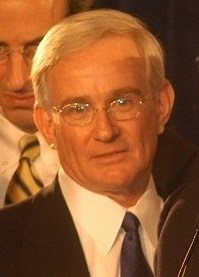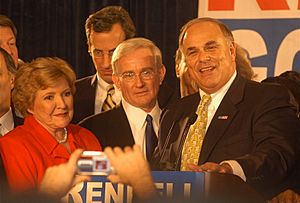Thomas J. Murphy Jr. facts for kids
Quick facts for kids
Thomas J. Murphy Jr.
|
|
|---|---|
 |
|
| 57th Mayor of Pittsburgh | |
| In office January 3, 1994 – January 3, 2006 |
|
| Preceded by | Sophie Masloff |
| Succeeded by | Bob O'Connor |
| Member of the Pennsylvania House of Representatives from the 20th district |
|
| In office January 4, 1983 – December 15, 1993 |
|
| Preceded by | Stephen Grabowski |
| Succeeded by | Barbara Burns |
| Member of the Pennsylvania House of Representatives from the 17th district |
|
| In office January 2, 1979 – November 30, 1982 |
|
| Preceded by | Robert Ravenstahl |
| Succeeded by | Bob Robbins |
| Personal details | |
| Born | August 15, 1944 Pittsburgh, Pennsylvania, U.S. |
| Political party | Democratic |
| Signature |  |
Thomas J. Murphy Jr. (born August 15, 1944) is an American politician who used to be the Mayor of Pittsburgh, Pennsylvania. He also served in the state government as a representative. After his time as mayor, he became an expert in urban development. He now helps communities understand how to improve their cities. This includes advice on real estate, using land wisely, and growing the economy.
Contents
Early Life and Education
Thomas Murphy grew up as the son of a steel worker. He went to John Carroll University in Cleveland, graduating in 1967. Later, he earned a degree in urban studies from Hunter College in 1973.
From 1970 to 1972, Murphy and his wife, Mona, worked with the Peace Corps in rural Paraguay. They helped build sanitation facilities and an elementary school. After returning to Pittsburgh, he worked as a community organizer before getting involved in politics.
Early Political Career
Murphy served as a state representative for two different districts. First, he represented the 17th district from 1979 to 1982. Then, he represented Pittsburgh's North Side, the 20th Legislative District, from 1983 to 1993.
In 1989, he tried to become the mayor of Pittsburgh but did not win the Democratic primary election. Sophie Masloff won that election.
In 1991, Murphy and two other state lawmakers worked to improve a regional industrial company in Pittsburgh. They wanted the company to include more women and minority leaders. They also pushed for the company to focus more on developing urban areas instead of just suburban ones.
As Mayor of Pittsburgh
Thomas Murphy was elected mayor of Pittsburgh in November 1993 and started his term in January 1994. He used his knowledge of city management to lead Pittsburgh. He helped bring in about $4.5 billion for economic development projects.
He also helped secure $1 billion for new sports stadiums, Heinz Field and PNC Park. He also helped fund a new David L. Lawrence Convention Center. This convention center became the largest certified "green" building in the United States in 2003.
Pittsburgh's Renaissance III
Mayor Murphy, along with Allegheny County Commissioners Bob Cranmer and Mike Dawida, led a big building boom in Pittsburgh. This period was called "Renaissance III." It helped change how people saw the city. This change was a reason why Pittsburgh was chosen to host the 2009 G-20 summit.
During his time as mayor, Murphy oversaw the transformation of over 1,000 acres (4 square kilometers) of old industrial land. This land was turned into new areas for businesses, homes, shops, and public spaces. He also encouraged department stores like Lazarus and Lord & Taylor to open in downtown Pittsburgh. However, both stores eventually closed within ten years.
Murphy also led the creation of more than 25 miles of new riverfront trails and urban green space.
Financial Challenges and Solutions
Pittsburgh faced financial difficulties during Murphy's time as mayor. The city could not expand its borders or combine with the county to share costs more evenly. This meant the city had to cover many expenses on its own.
In 2003, the city was declared financially "distressed" by the state. To help the city's finances, Murphy made the difficult decision to reduce the number of city employees, including some Pittsburgh Police officers. Some jobs were later saved by increasing the city's parking tax. This tax became the largest of its kind in the country.
While the parking tax was not popular at first, it has since been seen as a key factor in helping downtown Pittsburgh. It also encouraged people to use public transportation, bike lanes, and other "green" options. This tax helped create a strong financial base for the city for many years.
Murphy decided not to run for re-election in 2004.
Post-Political Life
After leaving City Hall, Thomas Murphy and his wife continued to live in their restored 150-year-old farmhouse in the North Side of Pittsburgh. They raised their two daughters, Shannon and Molly, and their son, T.J., there. He has one grandson, Wyatt Murphy.
From 2006 to 2023, Murphy worked as a Senior Resident Fellow for Urban Development at the Urban Land Institute (ULI). In this role, he led many advisory panels in places like Singapore, Ireland, Germany, China, the Philippines, and over 50 cities in the United States.
As of 2025, Murphy is a principal with Urban Development Advisors LLC. He continues to offer expert advice to communities. He helps them understand how real estate investment, smart land use, and economic growth can lead to lasting community improvements.
See also
Images for kids




